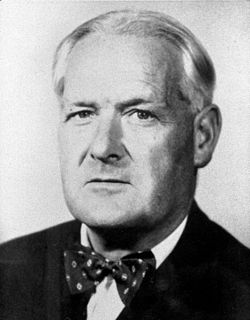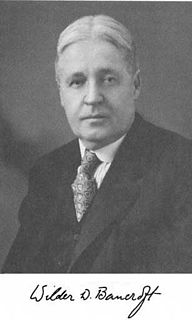A Quote by Claude Levi-Strauss
The work of the painter, the poet or the musician, like the myths and symbols of the savage, ought to be seen by us, if not as a superior form of knowledge, at least as the most fundamental and the only one really common to us all; scientific thought is merely the sharp point more penetrating because it has been whetted on the stone of fact, but at the cost of some loss of substance and its effectiveness is to be explained by its power to pierce sufficiently deeply for the main body of the tool to follow the head.
Quote Topics
Because
Been
Body
Common
Cost
Deeply
Effectiveness
Explained
Fact
Follow
Form
Fundamental
Head
Knowledge
Least
Like
Loss
Main
Merely
More
Most
Musician
Myths
Only
Ought
Painter
Penetrating
Pierce
Poet
Point
Power
Really
Savage
Scientific
Seen
Sharp
Some
Stone
Substance
Superior
Symbols
Thought
Tool
Us
Work
Related Quotes
The confidence in the unlimited power of science is only too often based on a false belief that the scientific method consists in the application of a ready-made technique, or in imitating the form rather than the substance of scientific procedure, as if one needed only to follow some cooking recipes to solve all social problems. It sometimes almost seems as if the techniques of science were more easily learnt than the thinking that shows us what the problems are and how to approach them.
Remember us in your prayers that we grow not weary in well doing. It is hard to work for years with pure motives, and all the time be looked upon by most of those to whom our lives are devoted as having some sinister object in view. Disinterested labor - benevolence - is so out of their line of thought, that many look upon us as having some ulterior object in view; but He who died for us, and Whom we ought to copy, did more for us than we can do for any one else. He endured the contradiction of sinners. We should have grace to follow in His steps.
None of us like the concept of law because none of us like the restraints it puts on us. But when we understand that God has given us his law to aid us in guarding our souls, we see that the law is for our fulfillment, not for our limitation. The law reminds us that some things, some experiences, some relationships are sacred. When everything has been profaned, it is not just my freedom that has been lost- the loss is everyone's. God gave us the law to remind us of the sacredness of life, and our created legal systems only serve to remind us of the profane judgments we make.
I stood there in the kitchen, watching her staring across the meadow still searching for her nemesis and I thought, suddenly, that this is all our lives - this is the one fact that applies to us all, that makes us what we are, our common mortality, our common humanity. One day someone is going to come and take us away: you don't need to have been a spy, I thought, to feel like this.
All scientific work is incomplete - whether it be observational or experimental. All scientific work is liable to be upset or modified by advancing knowledge. That does not confer upon us a freedom to ignore the knowledge we already have, to postpone action that it appears to demand at a given time. Who knows, asks Robert Browning, but the world may end tonight? True, but on available evidence most of us make ready to commute on the 8:30 next day.
At the risk, then, of being shunned by some of my gloomier peers, I venture to tell you that writers work like demons, suffer greatly, and are also happy, in unmistakable ways, some of the time. If we had no knowledge of happiness, our novels wouldn't sufficiently resemble real life. Some of us are even made a little bit happy, on occasion, by the writing process itself. I mean, really, if there wasn't some sort of enjoyment to be derived, would any of us keep doing it?
As Buddhists, statues are more than simply pieces of stone to us. We believe the statue of the Buddha has a kind of soul and is the Buddha in some sense. This is why we can pray to it. Clay is a very interesting and fundamental material - it's earth, it's water and - with fire - it takes on form and life. In fact, what is art? Art is giving to what you create a soul. That's why it is said God is like an artist.
It is an odd fact of evolution that we are the only species on Earth capable of creating science and philosophy. There easily could have been another species with some scientific talent, say that of the average human ten-year-old, but not as much as adult humans have; or one that is better than us at physics but worse at biology; or one that is better than us at everything. If there were such creatures all around us, I think we would be more willing to concede that human scientific intelligence might be limited in certain respects.
Songwriting is ... all about intuition - this thing pops into your head for a reason and it's up to you to follow it. It's like there's a spirit, or intuitive network, that comes through all of us, but most people don't take the time to think about it or remember it. These little things pop into our heads - it's just a process of intuition. The initial thought comes in a baby state, and you work on that some more.
If true, the Pythagorean principles as to abstain from flesh, foster innocence; if ill-founded they at least teach us frugality, and what loss have you in losing your cruelty? It merely deprives you of the food of lions and vultures...let us ask what is best - not what is customary. Let us love temperance - let us be just - let us refrain from bloodshed.
We can distinguish three groups of scientific men. In the first and very small group we have the men who discover fundamental relations. Among these are van't Hoff, Arrhenius and Nernst. In the second group we have the men who do not make the great discovery but who see the importance and bearing of it, and who preach the gospel to the heathen. Ostwald stands absolutely at the head of this group. The last group contains the rest of us, the men who have to have things explained to us.
The responsibility for the creation of new scientific knowledge - and for most of its application - rests on that small body of men and women who understand the fundamental laws of nature and are skilled in the techniques of scientific research. We shall have rapid or slow advance on any scientific frontier depending on the number of highly qualified and trained scientists exploring it.
True. The one certainty about riding, Braygan, is that - at some time - you will fall off. It is a fact. Another fact you might like to consider, in your life of perpetual terror, is that you will die. We are all going to die, some of us young, some of us old, some of us in our sleep, some of us screaming in agony. We cannot stop it, we can only delay it.





































